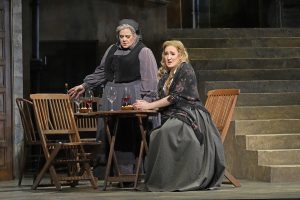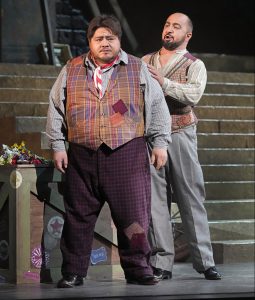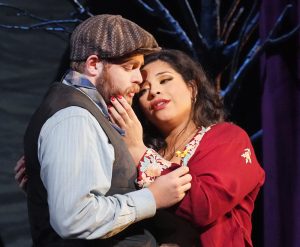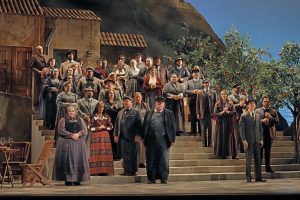REVIEW: Opera’s ultimate double-bill gets classy send-up

The double-bill of Pietro Mascagni’s Cavalleria rusticana (1890) and Ruggero Leoncavallo’s Pagliacci (1892) remains one of the most accessible evenings at the opera. With busy choruses, passionate arias and ensembles, and the “tears of a clown,” literally, these early verismo works offer much, to novice and seasoned opera buff alike.
No, verismo does not mean “opera for adults” (it refers to the sort of hyper-realism ushered into opera at the end of the 19th century), but it might as well: At the heart of both these works are themes of adultery, betrayal, revenge, and murderous jealousy. To be sure, none of this was new to opera, except for a sort of wanton frankness that would, just a few years later, evolve into the tawdry decadence of works such as Salome.
The Lyric Opera’s new production of Cav/Pag, as it has come to be called, opened at the Kauffman Center on September 23rd. It is visually arresting, smartly directed, and commandingly sung. These operas are singer-centered (they work only if the singing is above-average), and the Lyric brought a strong ensemble to the stage.
Soprano Samantha Hankey dominated Cavalleria in the role of Santuzza, the scorned and pregnant girlfriend, which she sang with fervor and sort of translucent beauty. Her “Voi lo sapete o mamma,” in which she detailed the complexity of her situation, was delivered with rare conviction. Tenor Adam Smith performed the fickle Turiddu with panache and a voice that delivered despite a certain stolidity.
 The magnificent baritone Gevorg Hakobyan sang in both operas, conveying the indignation of the husband, Alfio, in the Mascagni and the head-on sleaziness of the villainous schemer, Tonio, in the Leoncavallo. Despite the contrast, the baritone provided a musico-dramatic thread through the evening, delivering both roles with burnished colors and dark fury.
The magnificent baritone Gevorg Hakobyan sang in both operas, conveying the indignation of the husband, Alfio, in the Mascagni and the head-on sleaziness of the villainous schemer, Tonio, in the Leoncavallo. Despite the contrast, the baritone provided a musico-dramatic thread through the evening, delivering both roles with burnished colors and dark fury.
The seasoned contralto Jill Grove, a longtime superstar of the Metropolitan Opera, brought warmth and sincerity to the role of Mamma Lucia. Diego Torre lent pathos and a brilliantine tenor to the role of Canio (Pagliacci), the pitiful husband who must act the clown every night even as his heart is breaking.
His misfortune was our gain, though, as one of the evening’s highlights was the duet between his wife, Nedda (the vocally vivid Gabriella Reyes) and her lover, Silvio (crystalline tenor Luke Sutliff). Benjamin Ruiz was a firm Beppe, and the chorus here (and throughout the evening) sang with such fortissimo energy that we almost wished the stage were a bit deeper.
 Christine Boddicker was the sharp-witted Lola, Alfio’s wife, and the ever-confident Julia Scozzafava was the Peasant Woman (in Cavalleria). Director Shawna Lucey steered the proceedings with a sure hand, at times placing characters at quirky physical distances from each other: to convey, perhaps, the ambiguities of their feelings.
Christine Boddicker was the sharp-witted Lola, Alfio’s wife, and the ever-confident Julia Scozzafava was the Peasant Woman (in Cavalleria). Director Shawna Lucey steered the proceedings with a sure hand, at times placing characters at quirky physical distances from each other: to convey, perhaps, the ambiguities of their feelings.
The production introduced a brand-new set by Steven C. Kemp, handsomely outfitted with a large central staircase, a stage-left church façade that nearly every Romantic opera requires, and hazy glimpses of village and sea upstage. This was enhanced by clear-headed lighting design by Michael James Clark.

The muted costumes, rented from Sarasota Opera, were not always in keeping with the more vividly abstract set designs (trees growing on stairs!). But the chief element we missed was terra firma, as so much of the action had to happen on the staircase. Scenes requiring villagers to “mill around” called upon choristers to negotiate stairs while acting and singing. On the plus side, the rich orchestral scores were performed with dash by Roberto Kalb and the Kansas City Symphony.
Cav/Pag runs through October 1st. For tickets call 816-471-7344 or go to kcopera.org.
To reach Paul Horsley, performing arts editor, send an email to paul@kcindependent.com or find him on Facebook (paul.horsley.501) or Twitter/Instagram (@phorsleycritic).
Features

In 2015, the Kansas City Ballet treated its production of The Nutcracker to a complete makeover, with new set designs by Alain Vaës, costumes by Holly Hynes, and lighting by…

If any musical is worthy to be performed by an opera company, it is The Sound of Music. Its best songs are not just Rodgers & Hammerstein at their most…

Each spring, the Kansas City Ballet presents a program of mixed repertoire embodying some of the more fascinating trends in contemporary ballet: where dance has been recently, where it stands…






